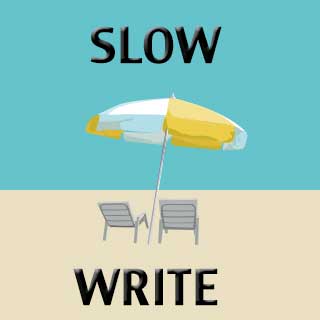When I was attending the RMC-SCBWI Letters & Lines Fall Conference, my roommate, Cheryl Reifsnyder, kickass writer and human being, mentioned a book that is already changing my writing life: The Art of Slow Writing: Reflections on Time, Craft, and Creativity by Louise DeSalvo.
The title resonated instantly, so I hopped on my phone and reserved it at the library. It was waiting for me on Monday. Note: I will be adding it to my permanent collection!
Feelings of Failure
Those of you who know me or have been following this blog know that I’m into year four+ of my young adult novel. I’ve probably written four or five posts related to the book (writing about the novel rather than writing the novel itself was a favorite procrastination technique 🙂 ). At least one post was about how I wanted to let go of my attachment to the years it was taking to write it because it always led me down the bummer path where I’d have thoughts like:
- Why can’t I write a novel a year like __________ (insert lots of author names here)
- My agent/editor/husband/friend thinks I’m a hack, but is just too nice to say so
- My agent is going to drop me as a client because I’m not delivering novels to her (I actually expressed this paranoid concern half-kiddingly and she laughed and put my mind at ease. Thank you, beautiful agent!)
The Power of Synchronicity
So I picked up the book and opened it at random to p. 111. It was chapter 23 “Radical Work Takes Time.” I almost dropped the book as tears pricked my eyes. Here was my experience staring back at me. I devoured the chapter, each sentence making me feel lighter, happier, and more committed than ever to completing my novel, even though the chapter was about authors who were experimenting and writing more objectively radical, sometimes mind-bending work.
Others may read this novel at a future date and not see it as a radical work in that sense—but it’s a radical work for me. I’m taking emotional risks, playing a little with structure, and finding it difficult and exhilarating at the same time. So I took from that chapter what I needed and I’m so grateful to Louise DeSalvo for writing it.
Room to Breathe
Even though I know that I’m in charge of myself, my life and my choices, sometimes it’s nice to have something come to you that reinforces what I know but may have forgotten, that reminds me that what I’m doing and how I’m doing it is okay.
It’s okay to allow ourselves to take our (writing) time. And maybe other kinds of time. Especially if it’s new territory. It’s okay to explore, to push ourselves, to let our guard down so something new might emerge.
It’s okay to write slow.
Slow write, take it easy. (Thanks, Foghat.)



